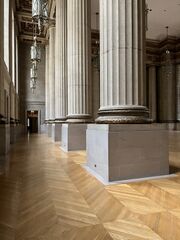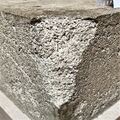Difference between revisions of "Sphinxstone"
Jump to navigation
Jump to search
| (3 intermediate revisions by the same user not shown) | |||
| Line 1: | Line 1: | ||
[[File:Sphinxstone 04.jpg|thumb|Columns in Mellon Auditorium built with Sphinxstone<br>Courtesy of [http://www.citadeldca.com Citadel DCA]]] | [[File:Sphinxstone 04.jpg|thumb|Columns in Mellon Auditorium built with Sphinxstone<br>Courtesy of [http://www.citadeldca.com Citadel DCA]]] | ||
==Description== | ==Description== | ||
| − | [Sphinx Acoustical Company] An acoustic [[cast stone]] produced by the Sphinx Acoustical Company. In 1934, Sphinxstone was used in the construction of the Mellon Auditorium in Washington | + | [Sphinx-Tone Acoustical Company] An acoustic [[cast stone]] produced by the Sphinx-Tone Acoustical Company of Washington, D.C. In 1934, Sphinxstone was used in the construction of the Andrew W. Mellon Auditorium in Federal Triangle, Washington D.C., designed by architect Arthur Brown Jr. During restoration of the building, visual inspection of the deteriorated sections of the concrete blocks indicated the stones contain mollusk shells and white Portland cement. Samples extracted for testing are undergoing analysis in preparation for cleaning and repairs (2022). |
[[File:Sphinxstone label 2.png|thumb|Sphinxstone label]] | [[File:Sphinxstone label 2.png|thumb|Sphinxstone label]] | ||
Latest revision as of 06:17, 6 July 2022
Description
[Sphinx-Tone Acoustical Company] An acoustic Cast stone produced by the Sphinx-Tone Acoustical Company of Washington, D.C. In 1934, Sphinxstone was used in the construction of the Andrew W. Mellon Auditorium in Federal Triangle, Washington D.C., designed by architect Arthur Brown Jr. During restoration of the building, visual inspection of the deteriorated sections of the concrete blocks indicated the stones contain mollusk shells and white Portland cement. Samples extracted for testing are undergoing analysis in preparation for cleaning and repairs (2022).
Additional images
Closeup of Sphinxstone column
Courtesy of Citadel DCACloseup of Sphinxstone column base
Courtesy of Citadel DCACloseup of Sphinxstone column base
Courtesy of Citadel DCA
Resources and Citations
- Lynn Scott Paden, Citadel DCA contributed information, June 2022.
- Richard Pieper, 'The Maintenance, Repair and Replacement of Historic Cast Stone' NPS, Technical Briefs #42 Link




